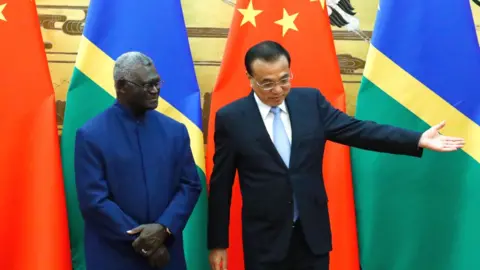Solomon Islands: China deal in Pacific stokes Australian fears
 Getty Images
Getty ImagesAustralia, New Zealand and the US have raised concerns on security in the Pacific, after China signed a security pact with the Solomon Islands.
The deal was signed this week, fuelling fears China may seek to build a naval base in the Pacific nation.
The Solomon Islands had rebuffed last ditch efforts by Australia - its biggest aid donor - to stop the deal.
Prime Minister Manasseh Sogavare said the pact would not "undermine peace and harmony" in the region.
The Solomon Islands leader added that the pact was not aimed at traditional allies but "rather at our own internal security situation".
He did not disclose the pact's terms, but insisted it was made "with our eyes wide open, guided by our national interests".
A leaked draft of the agreement, which was verified by the Australian government, said Chinese warships would be permitted dock on the islands and that Beijing could send security forces "to assist in maintaining social order".
The islands have been rife with social unrest in recent years and in November the Australian government sent personnel from its defence forces to help quell deadly riots in the capital Honiara, sparked after protesters stormed parliament in a bid to topple Mr Sogavare.
A spokesperson for the Chinese foreign ministry confirmed on Tuesday that the final agreement had retained the provisions on "maintaining social order".
'The worst failure of Australian foreign policy'
Australia's Foreign Minister Marise Payne and Pacific Minister Zed Seselja called the freshly signed deal "deeply disappointing", saying they were "concerned about the lack of transparency with which this agreement has been developed".
"Our consistently stated view, including from the perspective of Australia's national interests, remains that the Pacific family is best placed to meet the security needs of the region," they said in a joint statement.
Australia's Labor opposition called it the "worst failure of Australian foreign policy in the Pacific" in 80 years.
Prime Minister Scott Morrison - who is currently campaigning for re-election, in part on a platform of national security - denied that the pact was proof that his government had bungled its diplomacy with the Solomon Islands.
He added that he could not have gone around "telling leaders in Pacific islands what they should and shouldn't do".
But Mr Morrison said his country would not have a "submissive relationship" with China, which he said had made "all sorts of promises" to Pacific nations.
"We've always stood up to China because it's in our interests," Mr Morrison told reporters on Wednesday.
New Zealand's Foreign Minister Nanaia Mahuta, similarly said the country was "saddened" that the Solomon Islands had made the pact.
The Solomon Islands had earlier last month confirmed it was drafting a security deal with China.
This particularly concerned Australia, which is just 2000km (1,400 miles) south of the Solomon Islands. It has seen years of escalating tensions with China

The news comes days before US National Security Council official Kurt Campbell is due to arrive in the Solomon Islands for high-level talks.
The US has said it will re-open its embassy in the Solomon Islands, which has been closed since 1993.
